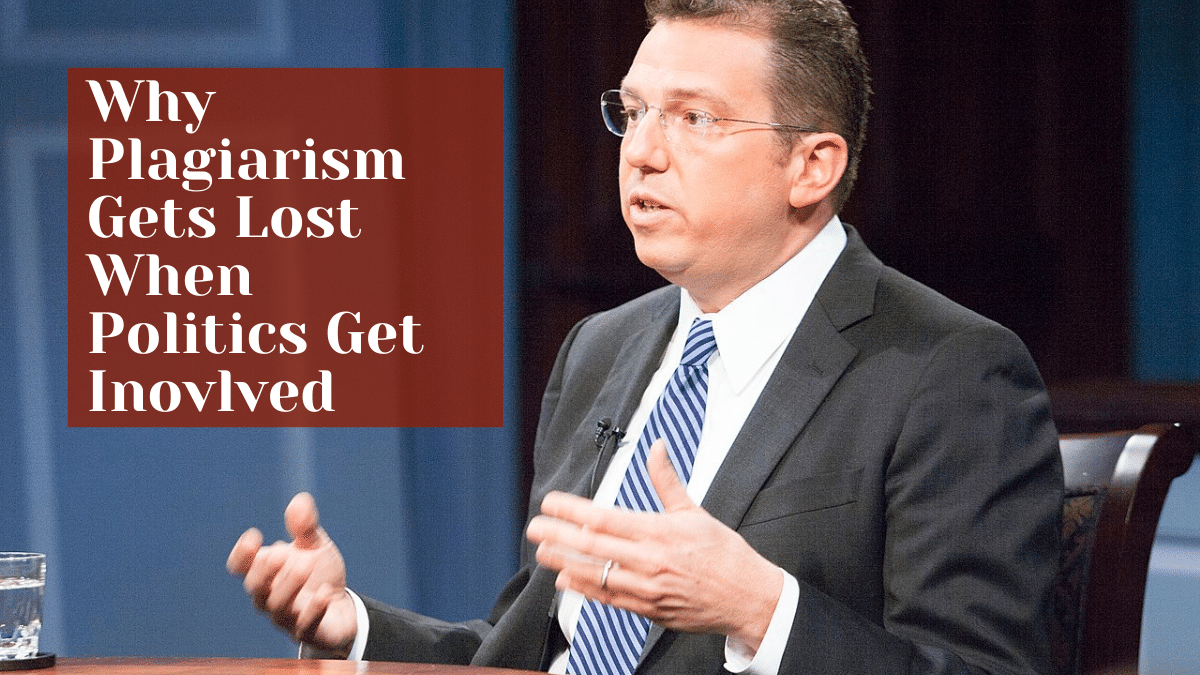Kevin Kruse and the Peak Political Plagiarism Scandal

On the surface, the plagiarism allegations against Kevin Kruse are pedestrian.
According to an article published on Reason, roughly six sentences of his 2000 dissertation at Cornell University contained text that was either copied directly or near-verbatim from outside sources that were not cited in the paper.
In an additional blog post, the author points to similar issues, albeit with weaker similarity, in Kruse’s 2015 book, One Nation Under God: How Corporate America Invented Christian America.
On the surface, these seem simple enough. They are reasonable, if somewhat minor, accusations of plagiarism that warrant further investigation. If these are the only problems, they would most likely be handled with a revision and little else.
However, Kruse is not your typical alleged plagiarist. Described as “history’s attack dog” Kruse has made a career for himself as an activist that corrects and criticizes right-wing talking points on history. He has over half a million followers on Twitter and high-profile position at Princeton, both of which have given him clout and
Furthermore, the author of both the Reason article and the blog post is Philip Magness. Magness, a conservative academic with the American Institute for Economic Research. Magness has butted heads with Kruse on multiple occasions in the past, including over Kruse’s contribution to the New York Time’s 1619 Project, a project that Magness was highly critical of.
The controversy has even caught the attention of Senator Ted Cruz, who, in a tweet, said that these were “serious charges that merit a full investigation.”
Kruse has his defenders, including L.D. Burnett, who said that many of the passages at issue were common knowledge and didn’t require any citation. She went on to add that the similarities in the language were not necessarily proof of copying, and that the accusations against Kruse were made in bad faith.
The bad faith or bad actor theme was also raised by Brian Rossenwald, who stated on Twitter that the allegations should be ignored.
But while the allegations themselves may not be that unusual or even that interesting, the story perfectly highlights the challenges of talking about plagiarism when it becomes mixed with politics.
In short, the well is very much poisoned, though there is not any one person or entity responsible for it.
Bad Actors and Poisoned Wells
When Magness’ critics, like Rosenwald, claim that Magness is a bad actor, they aren’t wrong.
One can pretty easily guarantee that no one would have investigated Kruse’s dissertation for plagiarism if he hadn’t been the lightning rod he is. It is almost guaranteed that there are countless other dissertations going unexamined with similar or even significantly worse issues.
It’s clear that Magness obtained the dissertation and examined it with the hope of discrediting him. In short, he was hoping to find plagiarism.
That said, bad actors don’t necessarily invalidate the information learned. For example, when political opponents of Senator John Walsh highlighted plagiarism in his work at the US Army War College, his degree was eventually revoked.
However, the process of making a determination on plagiarism is time-consuming. The allegations against Walsh were made in July and a final decision was not handed down until October. However, even that extended timeframe, the case was resolved extremely quick for such academic integrity cases, which often drag on for years.
Our modern political discourse does not allow for either the time to let these investigations unfold nor the nuance to talk about plagiarism effectively. This, in turn, is where we get to the poisoned well.
Whenever we get a political plagiarism scandal, the sides are drawn not on the severity of the plagiarism, but on the politics involved. How you feel about the alleged misdeeds likely says more about your politics than your views on plagiarism.
However, Kruse is not innocent here. In 2017 CNN alleged that they had found evidence of plagiarism in Sheriff David Clark’s master’s thesis from the Naval Postgraduate School. Kruse responded with a tweet that has now come back to haunt him.
In short, if the well around Kruse is poisoned, it’s because he helped poison it. He used his academic position to lend credibility to a snap judgment about plagiarism of a political opponent. Now, he is on the other end of that.
Clark, for the record, was accused of copying text without quotation marks while still including footnotes. Meanwhile, Kruse’s work doesn’t list the sources in footnotes. To many, this makes the allegations against Kruse more serious than Clark’s, which was an infraction he said they would expel a student over.
The truth is simple. Kruse was being very hyperbolic with Clark’s case. He was trying to use the news story to discredit Clark. Though the allegations against Clark and Kruse are very different, Clark’s dealt with approximately 50 passages but featured a different amount of rewriting and included footnotes, the atmosphere around them both is very similar.
That atmosphere is what makes serious conversations about this kind of plagiarism impossible. But it’s hard to feel sympathetic, as it is an atmosphere that Kruse helped create.
Moving Forward
To be clear, it is very important to check into the educational background of our political figures. This includes checking key works for plagiarism.
As we saw in a 2020 study, the price of tolerating political plagiarism is very high. Those that make it into office on the backs of plagiarized dissertations or theses, generally perform worse than those who earned their degree.
However, the issue at hand is that plagiarism investigations in the United States are not about checking behind our political leaders, it’s about finding ways to discredit opponents.
This bad faith approach doesn’t always invalidate the findings, it makes a serious discussion about the plagiarism impossible. Battle lines are drawn before the details are even known.
Moving forward, we need to separate the plagiarism investigation from the politics around it. In Germany, this is largely done Vroniplag group, a Wiki of academics that look through dissertations and theses. Though their focus isn’t solely political, they’ve been involved in many of the country’s plagiarism scandals.
However, even that isn’t likely to fully separate the plagiarism conversation from the politics. As we’ve seen in this case, academics are not immune to these forces and, in both Kruse’s and Magness’ cases, they both fell victim too.
In short, this may be as much a representation of our current political climate than anything to do with plagiarism. The political waters are turbulent and plagiarism is simply along for the ride.
Bottom Line
I agree completely that a further analysis of Kruse’s dissertation is warranted. The findings, while not especially severe by themselves, especially when you factor in it is a 600-page document, could be a sign of something more serious.
However, that investigation should not be done by Princeton, where Kruse currently works. The investigation into the dissertation should be done by Cornell, where it was submitted. Princeton could investigate the allegations into his book, as it was published through their press.
If it hadn’t been published through their press, the matter would have been more complicated, as schools have different policies regarding plagiarism in private publications. For example, the Kaavya Viswanathan case of 2006 saw Harvard take no action against her, though she was a student when she plagiarized in her book.
However, in Kruse’s case, the book was released through Princeton’s press, opening that door.
Still, this is ultimately a matter for the schools to deal with, and that process is going to take a long time. Though we live in a world where we expect, even demand, immediate responses and immediate closure, that’s not going to happen here.
In the end, this is an issue that I have bemoaned since at least 2008. Politically-motivated plagiarism attacks descend into mudslinging, and the important conversation about plagiarism is completely lost in the middle.
Though I’ve tried many times over the years to bring neutral analysis to these cases, I’ve come to realize that it’s largely a fool’s errand. Even when I’ve done my best, it’s been frustrating to see my work become a part of the political narrative rather than seen as analysis of it.
However, that’s something that’s almost guaranteed to happen here as well.
Header Image: Miller Center, CC BY 2.0, via Wikimedia Commons
Want to Reuse or Republish this Content?
If you want to feature this article in your site, classroom or elsewhere, just let us know! We usually grant permission within 24 hours.
